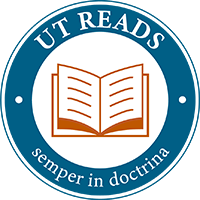
UT Reads is a campaign for The University of Texas at Austin to build a learning community through sharing the experience of reading the same book. We hope to initiate constructive conversation throughout our community about important and enriching topics.
UT Reads provides a discussion guide for group discussions among departments and teams. If you are interested in forming your own virtual reading group, contact Learning & Development for help setting up a team room within MS Teams.
At the end of the campaign we have a series of panel discussions, open to the whole UT community in a webinar format. Attendees contribute questions and relevant comments though written Q&A and the author joins us for the last panel discussion. If you missed the exciting discussions for our last campaign you can watch them on our YouTube channel.
The What, Why, and How of Reading Groups
WHAT is a reading group?
A reading group is an organized gathering of people that regularly discusses a book that all participants have read or are currently reading. Discussions within the group remain largely or entirely within the subject parameters set by the book.
WHY form a reading group within an organization?
Reading groups within an organization are an effective way to build rapport on a team, strengthen critical thinking, and improve communication. In turn, organizations may see improvement in problem solving, breaking down silos, increased engagement, and greater productivity.
Here is an interesting article about organization reading groups:
HOW do you form a reading group?
- Talk to your supervisor about approval to form the group. Be sure to discuss when the group can meet to discuss the book. Inquire if the department would like to sponsor the reading group by providing books for the participants.
- If forming a reading group is approved, send out an invitation to your organization. Here’s a sample:
Dear colleagues:
I would like to set up a reading group for the UT Reads campaign. You can find out more detail on this webpage: https://hr.utexas.edu/learning-development/programs/UT-Reads
If you are interested, please let me know by ______.
UT Learning & Development is providing a guide for the reading group, but we will should meet briefly to discuss logistics, like how often to meet and the format we will use meet (UT L&D can help us set up a group in MS Teams where we can create a chat board and have video calls). We will then schedule the times and dates for our discussions.
Thanks for your interest. Looking forward to hearing from you soon.
- During your initial meeting be sure to decide on the following items:
I. How often will you meet?
II. When will you meet?
III. What platform will you be using to meet?
- MS Teams
- Zoom
- Conference call
- Google Meet-up
- In-person (following guidelines established in Protect Texas.)
IV. How will the books be acquired and dispersed?
- Does each person have to acquire their own book?
- Are the books being given to the participants or loaned to them?
V. Ground rules for having an open and constructive conversation (see the UT L&D Reading Group Guide for suggestions).
VI. Any special needs or accessibility issues for participants so that everyone feels encouraged to participate and welcome to the group.

UT Reads YouTube Playlist
Did you miss the UT Reads panel discussions? Watch the recorded discussions on YouTube.
Past UT Reads Campaigns
Reading Groups
Contact
For questions about or requests for services, contact L&D through our brief intake form.